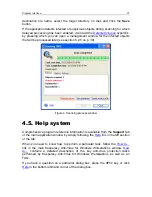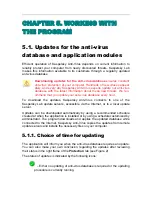
CHAPTER 3. KASPERSKY ANTI-
VIRUS
®
FOR WINDOWS
WORKSTATIONS
Kaspersky Anti-Virus
®
for Windows Workstations
(also referred in this user
guide to as Kaspersky Anti-Virus) is designed to protect workstations from the
viruses and malware.
The following features have been implemented in the application:
•
Real-time protection of file system against malicious code in the monitor-
ing mode
: interception and analysis of attempts to access the computer
file system and network directories; disinfection or deletion of infected ob-
jects or isolation of suspicious objects for further analysis.
•
Scan for and neutralization of malicious code on user’s or administrator’s
request
: detection and analysis of infected or suspicious objects in the de-
fined scanning areas; removal of infected and isolation of suspicious ob-
jects for further analysis.
•
Checking potentially dangerous software:
analysis of programs started in
the user’s computer, downloaded from the internet or located on the hard
drive or removable media. When potentially dangerous software is de-
tected, the application (depending on the settings) will either allow or
block its execution or remove this software from the user’s computer.
•
E-mail scanning in the monitoring mode
: analysis of requests for e-mail
sending or receiving. The anti-virus prevents e-mail messages containing
malicious code from penetrating the user’s mailbox or from sending sus-
picious or infected objects to other addresses. The anti-virus scans all in-
coming and outgoing Microsoft Outlook e-mail messages; it also scans
incoming and outgoing e-mail messages of any mail clients that use
SMTP and POP3 protocols.
•
Constant protection of office applications using VBA macros
: analysis of
macro commands prior to their execution and prevention of potentially
dangerous macro commands being executed.
•
Constant protection against execution of dangerous VBScript and
JavaScript scripts
: scanning of script code prior to its execution by the OS
script processing engine; blocking execution of dangerous scripts.
•
Quarantine of suspicious objects
: storage of discovered suspicious ob-
jects in a quarantine directory; on-demand dispatch of them to Kaspersky












































